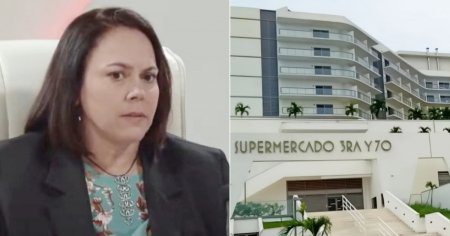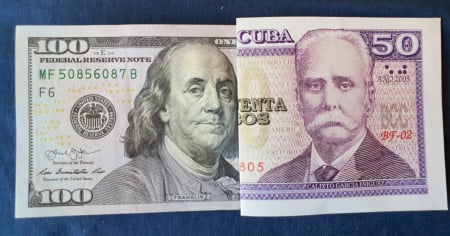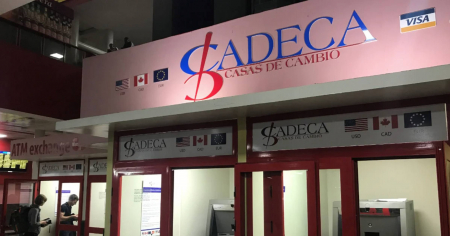
Related videos:
The Cuban economist Pedro Monreal criticized the dollarization in Cuba and questioned the regime for claiming that it aims to correct distortions in the economy when, in reality, it is amplifying them.
In a lengthy thread on his X account, Monreal analyzed the recent Round Table dedicated to the topic, which, in his opinion, included the "four horsemen of the Apocalypse" of official communication in Cuba: the lack of self-criticism, distortion, opacity, and insolence.
"The lack of self-criticism is evident in the use of phrases like 'economic situation' and 'projections to correct distortions and revitalizing the economy' to refer to a structural crisis and a series of poorly connected measures," he pointed out.
The expert is struck by the fact that a high-ranking official in the country – referring to Mildrey Granadillo de la Torre, First Deputy Minister of Economy and Planning – does not understand the process she is explaining. Or, if she does understand, she is trying to foist a deceptive narrative on the public. "Of course partial dollarization is not what they said. That 'definition' was just made up," he emphasized.
For Monreal, dollarization is a response to economic and political uncertainties, and in Cuba, what foreign currencies do is replace the basic functions of money that the Cuban peso does not fulfill adequately. "It's essentially about replacing with foreign currencies, not about 'capturing' foreign currencies," he clarified.
The recent measures of dollarization have led to an increase in the foreign currency in the informal market since December. The opening of stores operating in USD and the sale of cars in foreign currencies have resulted in a greater demand for dollars from the population, while the freely convertible currency (MLC) shows a downward trend.
According to Monreal, partial dollarization tends to complicate macroeconomic management, as it increases the risk of a liquidity crisis (the Central Bank cannot act as a lender of last resort for foreign currencies).
"Another distortion is the insistence on 'capturing' foreign exchange, when what is crucial is 'generating' foreign exchange. These are two different things. Dollarizing to 'capture' remittances does not resolve a basic component of the structural crisis: a failed model of international specialization," he emphasized.
The specialist also talked about the importance of remittances in transforming—not just energizing—the productive structure, as long as they are directed towards investment. He questioned the government for not providing information on the destination of remittances in Cuba.
"A supposed government program to 'advance towards a dedollarization of the economy' is vaguely stated, but without any explanation. What is known is that dollarization is actually expanding. It remains unclear what dedollarization could actually entail," he pointed out.
Monreal called on the authorities to assess the reasons why the Cuban peso is less effective than the dollar in fulfilling domestic monetary functions.
Finally, he accused state officials of insolence, as they revive old promises that did not work and fail to provide explanations for their failure, and he recalled the episodes involving CUC and the 'corralitos' of Cuban banks.
"In summary: the Cuban government exaggerates the supposed benefits and relevance of a 'partial dollarization' with no apparent connection to a structural reform of the economy, while also boasting about a de-dollarization program that it fails to explain," he concluded.
At the end of last year, the economist criticized the announcement by the regime of a supposed "new exchange regime", and pointed out that there are no grounds for it to be considered as such.
According to what was said then, the proposed change does not represent a significant transformation of the current exchange rate scheme; rather, it essentially maintains a fixed rate with variations in its secondary component for the "population and non-state sector."
The academic criticized Cuba's economic performance in 2024 and questioned the progress in revitalizing the economy and the macroeconomic stabilization announced by the government.
Monreal claims the country is facing a serious "stagflation," characterized by economic stagnation combined with high inflation, which worsens the standard of living for households.
In his view, the government distorts its narrative, as one cannot speak of a "revival of the economy" when it has contracted in four of the last six years. Furthermore, the GDP at constant prices in 2024 was lower than that of 2019, compounded by the impact of a dysfunctional energy system.
Frequently Asked Questions about Dollarization and the Economy in Cuba
What criticism does Pedro Monreal make about dollarization in Cuba?
Pedro Monreal criticizes that dollarization in Cuba amplifies economic distortions instead of correcting them. He argues that partial dollarization limits the effectiveness of monetary policy and increases the risk of a liquidity crisis, in addition to being a strategy more focused on attracting than generating foreign currency.
How does dollarization affect the Cuban peso?
Dollarization affects the Cuban peso by replacing its basic functions with foreign currencies, due to the reduced effectiveness of the peso in the domestic market. This weakens the national currency and complicates macroeconomic management, exacerbating economic inequalities among the population.
Why is the dollarization policy in Cuba considered problematic?
Monreal believes that the dollarization policy is problematic because it perpetuates an unequal economic model, benefiting only those who have access to foreign currency. Furthermore, it does not address the structural problems of the Cuban monetary system, such as the devaluation of the peso and the lack of transparency in the use of remittances and foreign currencies.
What is the relationship between investment in tourism and the economic crisis in Cuba?
Investment in tourism is criticized for neglecting essential sectors such as health and agriculture. Despite significant investments in the sector, tourism has not met the expected goals, raising questions about its sustainability and the government's focus on prioritizing it over other critical needs of the country.
Filed under:





